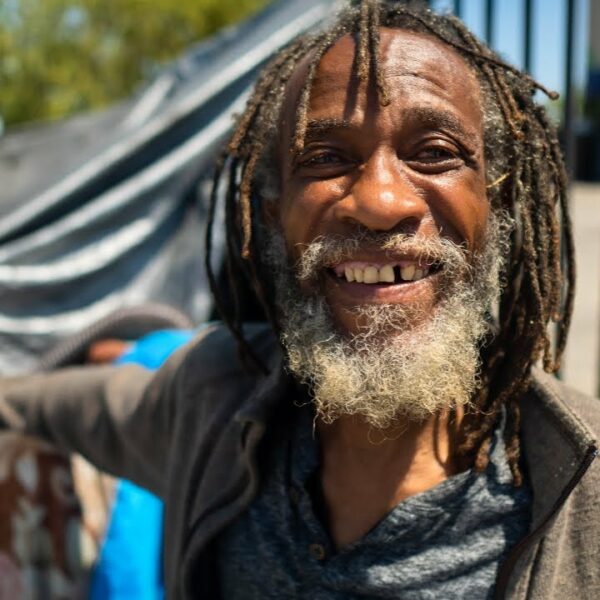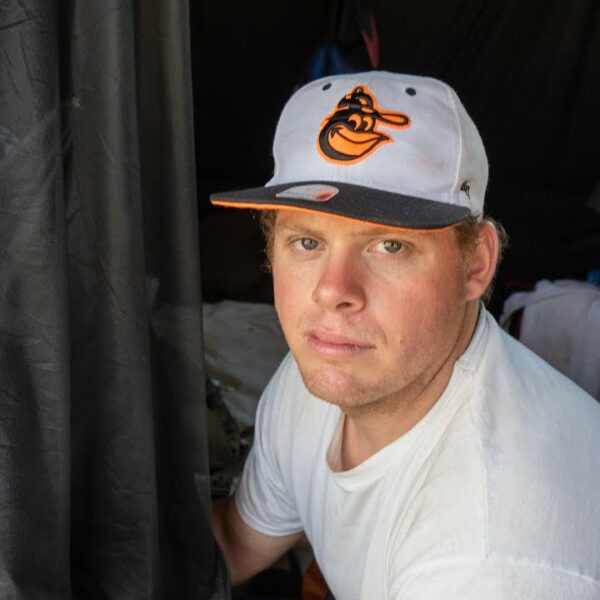Advocates say the City of Phoenix broke the law when it cleared one of the nation’s largest unhoused encampments last month.
In a motion filed in the District Court of Arizona, the ACLU of Arizona argued that Phoenix violated the constitutional rights of unhoused folks when city crews destroyed their property as they cleared an encampment known as “The Zone.” The filing cites a December court order from Judge Murray Snow that prohibited Phoenix from enforcing sleeping and camping bans against people who cannot obtain another shelter.
“Not only did the city of Phoenix violate an active court order, but they failed to follow their own protocols to treat unsheltered individuals with dignity and respect during a cleaning,” said Jared Keenan, legal director for the ACLU of Arizona. “The city should be held accountable for its conduct before any future cleanings can take place.”
Homeless People Prevented from Sharing Food and Lying Down
Phoenix has been embroiled in multiple lawsuits regarding its treatment of unhoused folks over the past few years. The ACLU initially sued the City in November 2022, challenging the constitutionality of its quality-of-life ordinances. Some prevented unhoused people from doing basic things like sharing food and lying down.
A coalition of Phoenix business owners also sued the City in December 2022, arguing that the encampment, home to about 700 people, impacted their ability to do business. Judge Scott Blaney sided with the business owners in late March and ordered Phoenix to clean up the encampment by June 10.
In April, Phoenix tentatively agreed to settle the lawsuits. However, whether the city would have to stop sweeping encampments altogether remained unclear. The ACLU of Arizona alleged that Phoenix has not only continued the sweeps, but the city has also used several potentially illegal measures to clear the encampment.
For instance, the ACLU submitted multiple written declarations from individuals who said crews had destroyed the property of unhoused folks at The Zone and threatened them with citation or arrest when no other shelter options were available.
“The property I saw collected and destroyed included tents, bedding, blankets, clothes, tarps, storage containers, a walker, mattresses, water coolers, and a bike,” Elizabeth Venable, co-founder, and lead organizer at the nonprofit plaintiff Fund for Empowerment said in her sworn declaration. “I saw the City use excavators and dump trucks to load up and destroy property… As the excavators scooped up property, many of the items were crushed.”
A resident of The Zone named Ronnie Massingille said that city crews destroyed personal items such as his Arizona ID, his birth certificate, and his diabetes medications during sweeps.
“It’s so degrading to watch the City throw away your belongings and know you have no control,” Massingille said in his sworn declaration. “If you try to intervene, you will be arrested. It feels like the City is putting their foot on your neck and holding you down so you can’t do better.”
Lack of Housing Keeps People on the Streets
The sweeps also come at a time when Arizona is struggling to respond to its local homelessness crisis. Federal data shows that the number of people experiencing homelessness in The Grand Canyon State has increased by 23% between 2020 and 2022, up to more than 13,000.
The data also showed that more than two-thirds of unaccompanied youths in Arizona—or young people under the age of 25 who are experiencing homelessness without a parent or legal guardian—do not have a place to sleep.
Local officials like Arizona Department of Housing Director Tom Simplot and Joanna Carr, the policy director for the Arizona Housing Coalition, agree that housing is the element that ties the two phenomena together.
“We can have all the money we could possibly use. We could have all the vouchers we could possibly use. But if we don’t have the units to actually house people, that money is basically worthless,” Simplot told AZ Central in January.
And Arizona’s problems with homebuilding seem like they will get worse in the near term.
Data from the Homebuilders Association of Central Arizona shows that building permits declined 17% between 2021 and 2022. The 22,000 total permits the association measured through October 2022 was nearly the same as the total of permits filed in all of 2015.
Part of the problem is that construction material prices have risen alongside interest rates. This makes it more costly to build a home and increases the cost of financing a home purchase altogether.
Arizona’s construction industry is also grappling with a labor shortage, which could extend the timeline for delivering new housing units to market, HACA Vice President of Municipal Affairs Jackson Moll told ABC15.
How You Can Help
The pandemic proved that we need to rethink housing in the United States. It also showed that aid programs work when providing agencies and service organizations with sufficient funds and clear guidance on spending aid dollars.
Contact your officials and representatives. Tell them you support keeping many of the pandemic-related aid programs in place for future use. They have proven effective at keeping people housed, which is the first step to ending homelessness.













